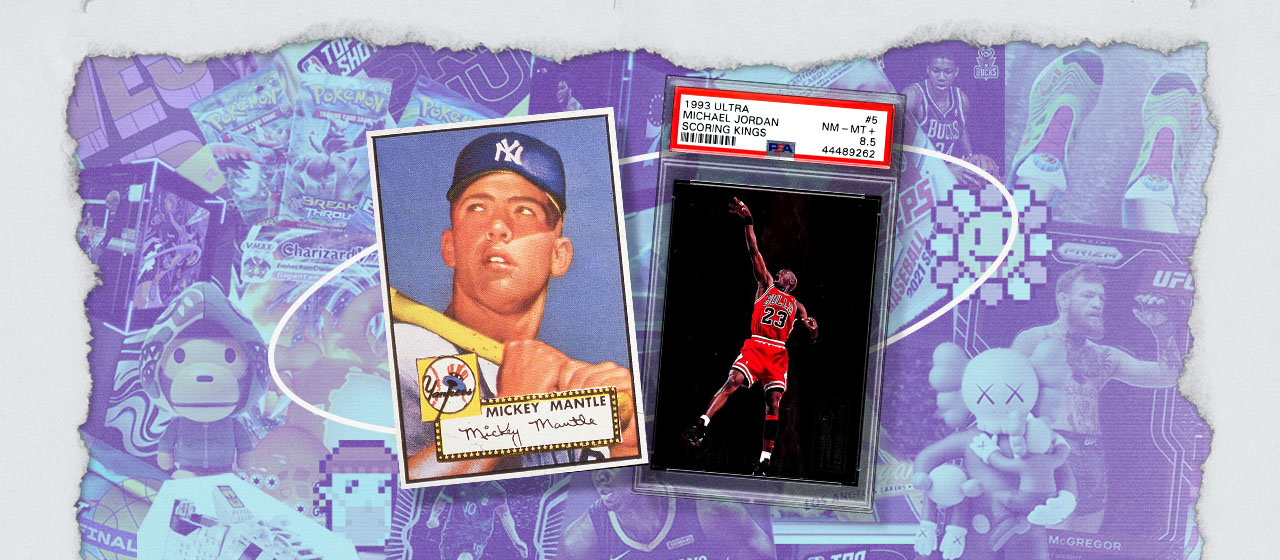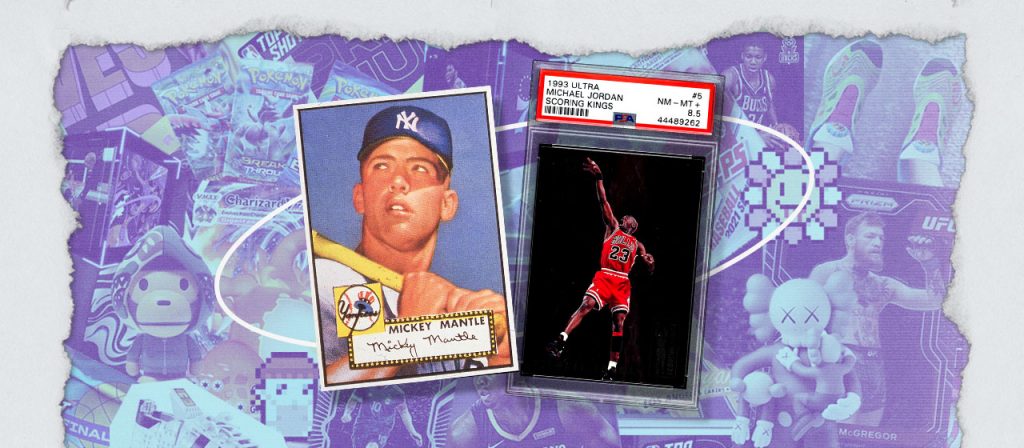



Surely you remember the days when you’d visit your local toy store with your buddies and between the snacks and drinks, you would grab a pack or two of sports trading cards. As kids, we weren’t able to afford jerseys or memorabilia, but we could easily flex our loyalty to our favorite teams with our sports card collections. Who would’ve guessed that a decade later, card collecting would make a major comeback in the midst of a global pandemic? Trading it one for another was child’s play, you can now make money from buying and reselling cards – here’s our beginner’s guide to collecting and investing in cards.
Sports cards are based on players within a sport, the most common being basketball, soccer, football, baseball, UFC and F1 leagues. Each card is based on a player that plays in a particular season, accurately portraying them on the field and in their team jerseys.
Biggest players in sports cards: Panini, Topps, Fleer (vintage cards only), Upper Deck, Fanatics (currently selling apparel and memoribilia, but they are slated to buy the license for the trading cards in 2025/2026).
Ever since news broke that resellers were making money from buying a store’s entire stock and flipping the coveted card for huge profits, buying cards hasn’t been as easy. Resellers eventually started to empty out entire supermarkets, toy stores and local card stores of their entire stash. Here in Singapore, the shortage isn’t as severe, but you might want to consider multiple ways of sourcing your cards.
1) Stores (Local Card Store)
Nothing beats heading down to your neighborhood store to buy boxes or packs of cards instantly. You can immediately open them and begin to sort out the cards of value and list them online for a quick flip.
Retail stores carry hobby boxes, retail boxes and single packs. But there are many bad actors who have learnt how to feel which packs have coveted cards or return resealed open packs after removing good cards. Though such practices are uncommon, it’s worth taking note of a store’s policies to ensure that you have a fair chance of scoring valuable cards.
2) Online buying
Like sneakers, you can buy cards, packs and blaster boxes online. You can use sites like eBay, Carousell, Facebook pages and forums, where you can purchase from resellers. If you are looking for a specific card, these platforms are the best source. And just like all other resale items, you need to be acutely aware of the current market values. Hit up sites like 130point.com to get an accurate evaluation of the cards you are looking for.
For a more reliable source, you can hit up Amazon, Lazada and other licensed stockists’ websites, to purchase your boxes or packs. Do check the sellers and ensure it is an official store. The prices may be fair, but fakes may still pop up.
3) Box breaking
A phenomenon that emerged during the pandemic, box breaking is a form of live stream that happens on social media platforms. The seller, or card breaker, opens an entire box of cards. In advance of opening the box, the card breaker will sell certain sets of cards for a set price. For sports, it could be a specific player, team or division, while for trading cards, it could be the types or attributes of the card. Some breakers will ship all the cards that fit the set you paid for while others just ship out the coveted cards. Box breaks replicate the thrill of gambling and are also the best way to get grail cards for cheap.
The next part of the formula is selling the cards you don’t intend to keep. Just like sneakers, NFTs or collectibles, there are many avenues where interested collectors can meet and transact through a trusted app or platform. Here are just some ways you can sell your stash off.
1) Forums
One way to sell your cards is through moderated forums like Blowout Forum, Sports Card Forum and a wide selection of Facebook pages. You can request for moderators to add you to groups where you can discuss everything related to sports cards while listing cards you have for sale. Plus, you get to chat with like-minded collectors all while dodging seller fees on more reputed platforms, like StockX and eBay.
2) Resale apps
If you are concerned about getting scammed or prefer having a middle-man mediate the transaction, you can sell your cards through resale platforms like eBay and StockX. They help ensure a smooth transaction and both parties show up as promised. In exchange for that reassurance, you have to pay a seller’s fee.
If you’re more invested in collecting rather than chasing a profit, trading is a viable method for obtaining the cards you are looking for. You can send off unwanted cards that might be valuable to others in exchange for the missing pieces of your collection.
1) Local card stores
Many card and hobby stores often have folders filled with rare and coveted cards that you can trade. If you have specific cards you’re looking for, you can opt to trade up the cards you have for them. Plus, if you know the team behind the store, they may hold you down with trades or offers that benefit you.
2) Forums
Trading can happen online as well. Moderated forums can help filter bad actors and ensure it is a safe space to buy, sell and trade coveted cards. But always do your due diligence and ensure your trades are to your benefit.
3) Card shows
Though they don’t take place much in Singapore, you can hit up card shows when you travel overseas. Events to bookmark are the ones like the National Sports Collectors Convention in Atlanta where collectors, dealers and any other interested groups gather to talk about everything related to sports cards. Plus you get to trade directly with an international pool of collectors and may even score rare pieces like autographed cards.
The value of a card is determined by so many factors. Here’s a rundown of some of the key variables used to determine how much a card is worth.
Rookie cards – Every player’s rookie cards will always hold the highest values. However, two exact rookie cards may hold different values due to the condition of the cards.
Condition of the card – Just like a sneaker, the condition of a card determines its value. The main attributes are centering, edges, corners and surfaces. Centering is about how centred the images are on the card. Valuation also looks at the condition of the edges and corners, checking for fraying and damage. The final attribute is surfaces, where collectors look for scratches on the print and damages that occur from being folded.
Preservation of condition – this basically looks at where a card is kept secure in a card sleeve, top loader or magnetic case. These prevent damage from the elements and keep the card in mint condition.
Grading – you can take your collection to the next level by having your cards professionally graded by Professional Sports Authenticator (PSA), Beckett Grading Services (BGS) and SGC. They will give the cards a grading between 1 to 10 which helps summarize the quality and condition of the card. Plus they help put the cards in slabs to preserve their condition. If the card earns a perfect or close to perfect grading, this raises the value of the card and almost guarantees a profit on your investment.
Grading is especially helpful to vintage card collectors. Card grading companies can help spot fakes, which are common among vintage cards. Bad actors would erase “reprint” markers on vintage cards or intentionally age them to look old in order to pass them off for genuine cards – artificially inflating the value of a card.
Player performance – This is where the betting element comes into play. The value of any sports card is based on the real-life performance of the player and their team. Just like signature sneakers, a sports card’s value is inherently linked to the player’s presence in popular culture. As the player wins awards, wins championships or titles and builds a loyal fan base, their cards will rise in value. The most valuable of the lot will always be their rookie cards.
However, the inverse is also true. If the player faces controversies or fails to remain relevant in the sport, their card’s value stagnates. Knowing the potential of a player and making predictions on their future standings mirrors the thrill of playing stocks or gambling.
There are many ways you can approach sports card collecting and reselling. It is entirely down to which aspects of the sports and culture you value the most. Here are some of the common types of collectors you will meet as you venture into sports card collecting:
Players-based collector – These collectors focus on building collections that revolve around a single player or group of players that they love or idolize. So they will work to have every card made from their time in the sport.
Team-based collectors – These collectors work to have a collection that reflects the evolution and progress of their favorite team.
Rookie card collectors – This approach has a slight gambling element to it. Here, collectors will intentionally seek out the rookie cards of new entrants to a sport. They want to support new players and bet on their success, eventually amassing a valuable card collection full of rookie cards of players they believed in.
Vintage collectors – These collectors are invested in the story and history of a sport. Vintage collectors are constantly on the hunt for cards that reflect iconic moments in their sport of choice or players who have a monumental impact.
How do you choose which to collect? Like any other form of collecting (sneakers, art, NFTs, etc.), you should buy what peaks your interest and is affordable to you. The value of collectibles are incredibly volatile depending on the twists and turns of popular culture. When at their peak, you can take advantage of these cultural shifts to turn a sweet profit.
However, eventually the hype will die down and you don’t want to be left with a sizeable card collection that means nothing to you. Instead, by building a collection that reflects the teams or players you support or encapsulates special moments in the game, you would always have a story to tell and find value in them, even if it is not monetary.